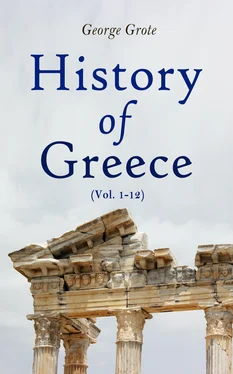George Grote - History of Greece (Vol. 1-12)
Здесь есть возможность читать онлайн «George Grote - History of Greece (Vol. 1-12)» — ознакомительный отрывок электронной книги совершенно бесплатно, а после прочтения отрывка купить полную версию. В некоторых случаях можно слушать аудио, скачать через торрент в формате fb2 и присутствует краткое содержание. Жанр: unrecognised, на английском языке. Описание произведения, (предисловие) а так же отзывы посетителей доступны на портале библиотеки ЛибКат.
- Название:History of Greece (Vol. 1-12)
- Автор:
- Жанр:
- Год:неизвестен
- ISBN:нет данных
- Рейтинг книги:5 / 5. Голосов: 1
-
Избранное:Добавить в избранное
- Отзывы:
-
Ваша оценка:
- 100
- 1
- 2
- 3
- 4
- 5
History of Greece (Vol. 1-12): краткое содержание, описание и аннотация
Предлагаем к чтению аннотацию, описание, краткое содержание или предисловие (зависит от того, что написал сам автор книги «History of Greece (Vol. 1-12)»). Если вы не нашли необходимую информацию о книге — напишите в комментариях, мы постараемся отыскать её.
History of Greece (Vol. 1-12) — читать онлайн ознакомительный отрывок
Ниже представлен текст книги, разбитый по страницам. Система сохранения места последней прочитанной страницы, позволяет с удобством читать онлайн бесплатно книгу «History of Greece (Vol. 1-12)», без необходимости каждый раз заново искать на чём Вы остановились. Поставьте закладку, и сможете в любой момент перейти на страницу, на которой закончили чтение.
Интервал:
Закладка:
From all these various countries, novelties, unknown to the Homeric men, found their way into the Grecian worship: and there is one amongst them which deserves to be specially noticed, because it marks the generation of the new class of ideas in their theology. Homer mentions many persons guilty of private or involuntary homicide, and compelled either to go into exile or to make pecuniary satisfaction; but he never once describes any of them to have either received or required purification for the crime. 52Now in the time subsequent to Homer, purification for homicide comes to be considered as indispensable: the guilty person is regarded as unfit for the society of man or the worship of the gods until he has received it, and special ceremonies are prescribed whereby it is to be administered. Herodotus tells us that the ceremony of purification was the same among the Lydians and among the Greeks: 53we know that it formed no part of the early religion of the latter, and we may perhaps reasonably suspect that they borrowed it from the former. The oldest instance known to us of expiation for homicide was contained in the epic poem of the Milesian Arktinus, 54wherein Achillês is purified by Odysseus for the murder of Thersitês: several others occurred in the later or Hesiodic epic—Hêraklês, Pêleus, Bellerophôn, Alkmæôn, Amphiktyôn, Pœmander, Triopas,—from whence they probably passed through the hands of the logographers to Apollodôrus, Diodôrus, and others. 55The purification of the murderer was originally operated, not by the hands of any priest or specially sanctified man, but by those of a chief or king, who goes through the appropriate ceremonies in the manner recounted by Herodotus in his pathetic narrative respecting Crœsus and Adrastus.
The idea of a special taint of crime, and of the necessity as well as the sufficiency of prescribed religious ceremonies as a means of removing it, appears thus to have got footing in Grecian practice subsequent to the time of Homer. The peculiar rites or orgies, composed or put together by Onomakritus, Methapus, 56and other men of more than the ordinary piety, were founded upon a similar mode of thinking, and adapted to the same mental exigencies. They were voluntary religious manifestations, superinduced upon the old public sacrifices of the king or chiefs on behalf of the whole society, and of the father on his own family hearth—they marked out the details of divine service proper to appease or gratify the god to whom they were addressed, and to procure for the believers who went through them his blessings and protection here or hereafter—the exact performance of the divine service in all its specialty was held necessary, and thus the priests or Hierophants, who alone were familiar with the ritual, acquired a commanding position. 57Generally speaking, these peculiar orgies obtained their admission and their influence at periods of distress, disease, public calamity and danger, or religious terror and despondency, which appear to have been but too frequent in their occurrence.
The minds of men were prone to the belief that what they were suffering arose from the displeasure of some of the gods, and as they found that the ordinary sacrifices and worship were insufficient for their protection, so they grasped at new suggestions proposed to them with the view of regaining the divine favor. 58Such suggestions were more usually copied, either in whole or in part, from the religious rites of some foreign locality, or from some other portion of the Hellenic world; and in this manner many new sects or voluntary religious fraternities, promising to relieve the troubled conscience and to reconcile the sick or suffering with the offended gods, acquired permanent establishment as well as considerable influence. They were generally under the superintendence of hereditary families of priests, who imparted the rites of confirmation and purification to communicants generally; no one who went through the prescribed ceremonies being excluded. In many cases, such ceremonies fell into the hands of jugglers, who volunteered their services to wealthy men, and degraded their profession as well by obtrusive venality as by extravagant promises: 59sometimes the price was lowered to bring them within reach of the poor and even of slaves. But the wide diffusion, and the number of voluntary communicants of these solemnities, proves how much they fell in with the feeling of the time and how much respect they enjoyed—a respect, which the more conspicuous establishments, such as Eleusis and Samothrace, maintained for several centuries. And the visit of the Kretan Epimenidês to Athens—in the time of Solôn, and at a season of the most serious disquietude and dread of having offended the gods—illustrates the tranquillizing effect of new orgies 60and rites of absolution, when enjoined by a man standing high in the favor of the gods and reputed to be the son of a nymph. The supposed Erythræan Sibyl, and the earliest collection of Sibylline prophecies, 61afterwards so much multiplied and interpolated, and referred (according to Grecian custom) to an age even earlier than Homer, appear to belong to a date not long posterior to Epimenidês. Other oracular verses, such as those of Bakis, were treasured up in Athens and other cities: the sixth century before the Christian æra was fertile in these kinds of religious manifestations.
Amongst the special rites and orgies of the character just described, those which enjoyed the greatest Pan-Hellenic reputation were attached to the Idæan Zeus in Krête, to Dêmêtêr at Eleusis, to the Kabeiri in Samothrace, and to Dionysos at Delphi and Thebes. 62That they were all to a great degree analogous, is shown by the way in which they unconsciously run together and become confused in the minds of various authors: the ancient inquirers themselves were unable to distinguish one from the other, and we must be content to submit to the like ignorance. But we see enough to satisfy us of the general fact, that during the century and a half which elapsed between the opening of Egypt to the Greeks and the commencement of their struggle with the Persian kings, the old religion was largely adulterated by importations from Egypt, Asia Minor, 63and Thrace. The rites grew to be more furious and ecstatic, exhibiting the utmost excitement, bodily as well as mental: the legends became at once more coarse, more tragical, and less pathetic. The manifestations of this frenzy were strongest among the women, whose religious susceptibilities were often found extremely unmanageable, 64and who had everywhere congregative occasional ceremonies of their own, apart from the men—indeed, in the case of the colonists, especially of the Asiatic colonists, the women had been originally women of the country, and as such retained to a great degree their non-Hellenic manners and feelings. 65The god Dionysos, 66whom the legends described as clothed in feminine attire, and leading a troop of frenzied women, inspired a temporary ecstasy, and those who resisted the inspiration, being supposed to disobey his will, were punished either by particular judgments or by mental terrors; while those who gave full loose to the feeling, in the appropriate season and with the received solemnities, satisfied his exigencies, and believed themselves to have procured immunity from such disquietudes for the future. 67Crowds of women, clothed with fawn-skins and bearing the sanctified thyrsus, flocked to the solitudes of Parnassus, or Kithærôn, or Taygetus, during the consecrated triennial period, passed the night there with torches, and abandoned themselves to demonstrations of frantic excitement, with dancing and clamorous invocation of the god: they were said to tear animals limb from limb, to devour the raw flesh, and to cut themselves without feeling the wound. 68The men yielded to a similar impulse by noisy revels in the streets, sounding the cymbals and tambourine, and carrying the image of the god in procession. 69It deserves to be remarked, that the Athenian women never practised these periodical mountain excursions, so common among the rest of the Greeks: they had their feminine solemnities of the Thesmophoria, 70mournful in their character and accompanied with fasting, and their separate congregations at the temples of Aphroditê, but without any extreme or unseemly demonstrations. The state festival of the Dionysia, in the city of Athens, was celebrated with dramatic entertainments, and the once rich harvest of Athenian tragedy and comedy was thrown up under its auspices. The ceremonies of the Kurêtes in Krête, originally armed dances in honor of the Idæan Zeus, seem also to have borrowed from Asia so much of fury, of self-infliction, and of mysticism, that they became at last inextricably confounded with the Phrygian Korybantes or worshippers of the Great Mother; though it appears that Grecian reserve always stopped short of the irreparable self-mutilation of Atys.
Читать дальшеИнтервал:
Закладка:
Похожие книги на «History of Greece (Vol. 1-12)»
Представляем Вашему вниманию похожие книги на «History of Greece (Vol. 1-12)» списком для выбора. Мы отобрали схожую по названию и смыслу литературу в надежде предоставить читателям больше вариантов отыскать новые, интересные, ещё непрочитанные произведения.
Обсуждение, отзывы о книге «History of Greece (Vol. 1-12)» и просто собственные мнения читателей. Оставьте ваши комментарии, напишите, что Вы думаете о произведении, его смысле или главных героях. Укажите что конкретно понравилось, а что нет, и почему Вы так считаете.












